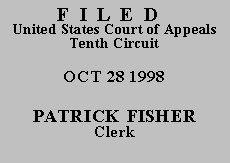

| UNITED STATES OF AMERICA,
Plaintiff-Appellee, Defendant-Appellant. |
No. 98-3108
(D.C. No. 97-CV-3126) (Kansas) |
David L. Johnson brought this pro se petition to vacate, set aside, or correct a sentence pursuant to 28 U.S.C. § 2255, alleging several constitutional errors. The district court denied relief, concluding that the claims were without merit, and denied Mr. Johnson's request for a certificate for appealability. For the reasons that follow, we deny Mr. Johnson's renewed application for a certificate of appealability and dismiss the appeal.
Mr. Johnson was convicted for distributing and possessing phenyl-2-propane in violation of 21 U.S.C. § 841 (a)(1) and (b)(1)(C), and sentenced to one hundred sixty-two (162) months incarceration, followed by a six-year term of supervised release. We affirmed in part and remanded for resentencing. United States v. Johnson, 12 F.3d 1540 (10th Cir. 1993). Several years after his resentencing, Mr. Johnson brought this 28 U.S.C. § 2255 petition alleging four issues.(1) The government filed a response and Mr. Johnson filed his first amended petition. The district court denied relief in part but granted relief for excessive sentencing due to the absence of evidence that the government had provided enhancement information.
The government moved for reconsideration, offering evidence that it had properly filed the required enhancement information pursuant to 21 U.S.C. § 851 and had delivered a copy to Mr. Johnson's attorney. Seven months after Mr. Johnson filed the original claim and two months after the district court decided the case, Mr. Johnson filed a second motion to amend his section 2255 claim, seeking to add three new contentions.(2) The district court denied this motion as untimely, pointing out that petitioner could have raised the new issues earlier and that he offered no explanation for the delay. The court alternatively held the amendment would be futile because petitioner would lose on the merits. The court also granted the government's motion to reconsider the court's first ruling and held Mr. Johnson was not entitled to resentencing as the court had originally determined. The court then denied Mr. Johnson's request for a certificate of appealability.
A habeas petitioner is required to obtain a certificate of appealability prior to seeking appellate review of final orders in a proceeding under 28 U.S.C. § 2255. A habeas petitioner is entitled to a certificate of appealability only if he has made "a substantial showing of the denial of a constitutional right." 28 U.S.C. § 2253 (c)(2). We review a petitioner's application de novo.
Mr. Johnson first contends that his second motion to amend is procedural and not subject to a certificate of appealability under 28 U.S.C. § 2253 (c)(1)(B). Therefore, he asserts, his motion to amend should be reviewed on the merits. We reject this argument. Mr. Johnson's second motion to amend is a part of his section 2255 appeal and is thus subject to section 2253.
In his request for a certificate of appealability, Mr. Johnson argues that the district court's denial of his second motion to amend was a violation of his constitutional right of due process and he reasserts the merits of the issues he wants to amend to include. He does not raise the issues he asserted in his first amended petition on which the district court denied relief.
We are not persuaded by Mr. Johnson's arguments. We have clearly stated that untimeliness alone is a sufficient reason to deny leave to amend. Hom v. Squire, 81 F.3d 969, 973 (10th Cir. 1996) (citing Frank v. U. S. West, Inc.,
3 F.3d 1357, 1365 (10th Cir. 1993)). Mr. Johnson's second motion to amend was seven months late and two months after the court's hearing on the merits. The motion also offered no new facts or law that couldn't have been included earlier. The district court properly denied Mr. Johnson's second motion to amend and certainly did not violate his constitutional rights in doing so. Consequently, the merits of the second amended motion were not before the district court and are not before us.
Mr. Johnson has failed to make a "substantial showing of the denial of a constitutional right." Consequently, we DENY his request for a certificate of appealability and DISMISS his appeal. See 28 U.S.C. § 2253 (c).
ENTERED FOR THE COURT
Stephanie K. Seymour
Chief Judge
*.This order and judgment is not binding precedent, except under the doctrines of law of the case, res judicata, or collateral estoppel. The court generally disfavors the citation of orders and judgments; nevertheless, an order and judgment may be cited under the terms and conditions of 10th Cir. R. 36.3.
1.The issues raised below were a Fifth Amendment violation for improper use of defendant's post-Miranda silence; excessive sentencing beyond the maximum time authorized by law; and ineffective assistance of counsel for errors associated with the misuse of post-Miranda silence and excessive sentencing.
2.The new issues were ineffective assistance of counsel during plea negotiations, failure of the court to comply with Rule 11, and erroneous denial at sentencing of a reduction for acceptance of responsibility.